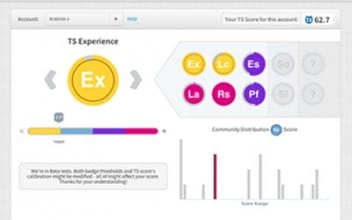A new broker-independent trading platform called TradeSlide is promising to do for independent traders what Klout did for social media users. The company, which was founded by Juan Colón (CEO) and Javier Colón, aims to help independent traders bridge the credibility gap between themselves and professional traders working for institutional investors.
The company was founded on the belief that there are many independent investors that are just as good, if not better, than their Wall Street counterparts when it comes to trading. The brothers identified that the main problem facing independent traders was a lack of starting capital, which prevents them from making enough money to trade full-time. Professional traders do not have this problem, as they have their client’s money to invest, and the professional credibility to attract those clients. An independent trader, on the other hand, doesn’t have this automatic credibility, or any tangible way to advertise their investability to potential clients. This is the problem that TradeSlide seeks to remedy.
Tradeslide is a free, gamified trading platform that enables traders to diagnose their trading skills on an ongoing basis. This takes the form of ‘badges’ that can be earned for attaining various trading skills. Each of these badges has a score attached to them, related to your trading activities and performance, and these scores change over time to reflect your improvement (or otherwise) as a trader. If you get a top score in all of the badges, it certifies you as an investable trader and opens you up to a market of potential clients that can back you with their capital.
As well as the scores for individual skills, there is a total score known as the TS score. This is best thought of as being like a Klout score for your trading skills, showing potential investors how investable you are. Once you have a TS score, you will be placed on a leaderboard along with other TS users, and you can let everybody know about it via Twitter, Blogs, or your personal website. It’s completely democratic, which means that any trader based anywhere in the world could attract significant financial backing if they had a high enough TS score. As well as the basic TS score itself, the platform also provides you with a TS Journal, which presents all your trades in a public, interactive timeline. This, along with the badges system, helps potential investors to distinguish between skilful traders and those that are merely lucky.
Of course, obtaining a high TS score and using it to attract investment is a highly attractive proposition for experienced, successful independent traders, but the platform also has something to offer the less experienced trader in the form of the TS Challenge. This is a gamified educational programme aimed at helping less experienced traders to hone their skills towards the point where they can become investable. To help them further, TradeSlide offers an online knowledge base, with educational articles written by, and rated by, traders.
TradeSlide are not the first to provide a gamified approach to trading. Before launching the leading social trading network OpenBook, eToro started off with a gamified trading platform that presented currency price movements in the form of games, such as a tug of war or a race between currencies. Approaches such as these make trading more accessible and easy to understand for the novice, and also provide a different way of looking at the markets for more experienced traders. While TradeSlide’s system may seem similar to the social trading models we have seen at the likes of eToro, FXCM, and Currensee, the exportability of the TS score gives it a unique selling point. The only question now is whether TradeSlide will catch on sufficiently for the TS score to become widely recognised.
Tradersdna is a leading digital and social media platform for traders and investors. Tradersdna offers premiere resources for trading and investing education, digital resources for personal finance, market analysis and free trading guides. More about TradersDNA Features: What Does It Take to Become an Aggressive Trader? | Everything You Need to Know About White Label Trading Software | Advantages of Automated Forex Trading











